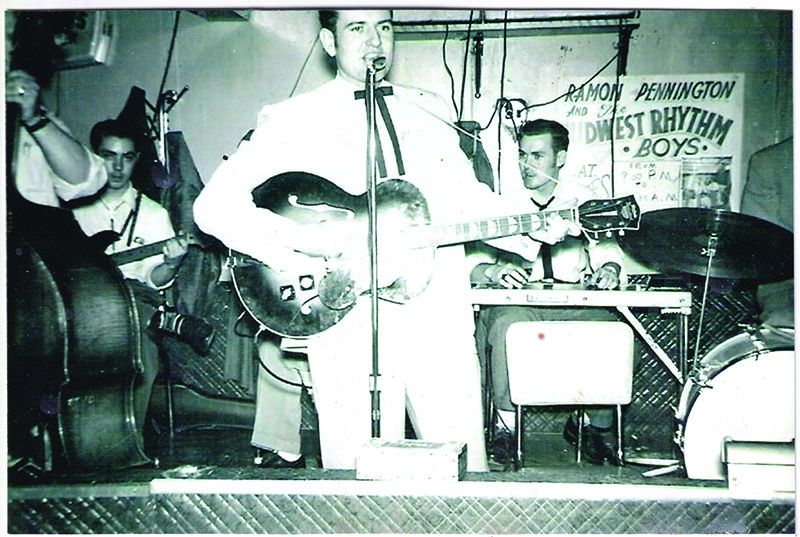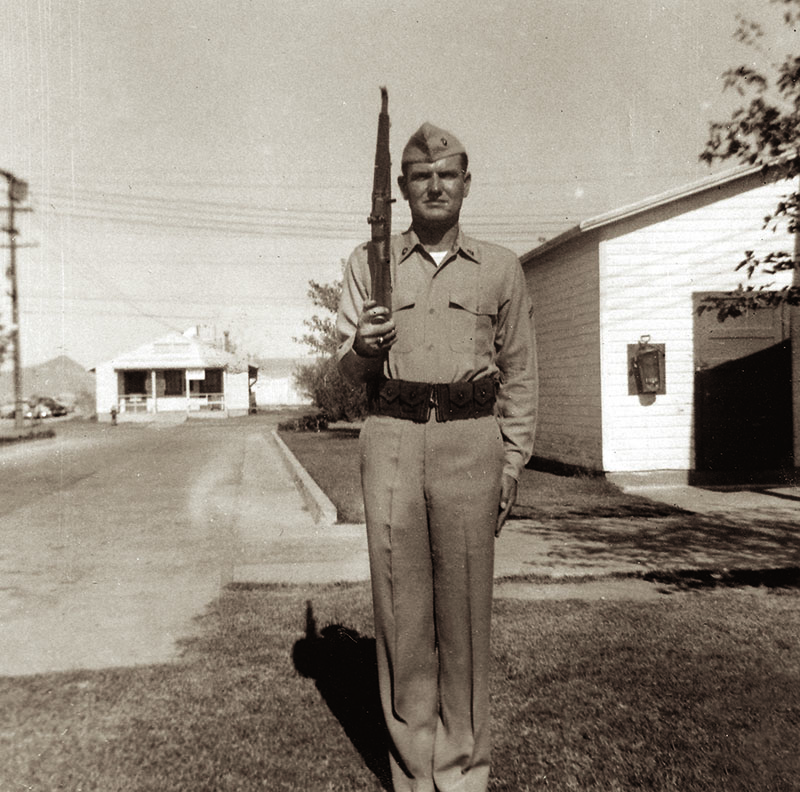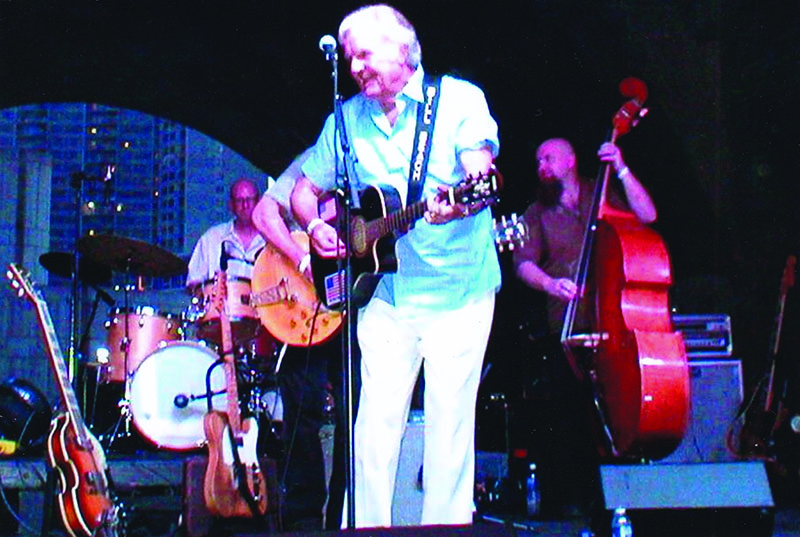
The Rockabilly Marine
By: Kipp HanleyPosted on June 15, 2025
Bill Beach could always shoot a rifle.
As a Depression-era child, the Kentucky native could light a matchstick from 100 yards out with his .22. He would often take out wild boar that were roaming the tobacco farm where he and his family worked, and his shooting prowess made him an Expert marksman while serving in the Marine Corps a few years later.
But Beach could also play a mean guitar, an instrument that brought him local fame and a lifetime filled with songwriting. More than five decades after releasing his signature single “Peg Pants” on the Cincinnati-based King Records label, Beach was inducted into the Rockabilly Hall of Fame. On Oct. 28, 2024, Beach died at the age of 92 in Hamilton, Ohio, leaving behind wonderful memories for his family and friends and a love for the Marine Corps.
“He often told young people that were considering service to not waste time with the green uniforms, you want to go into the Marines,” said daughter Bonnie McDaniel. “[He said] it will prepare you for what life is like outside of the service.”
Born in 1932 in rural Gallatin County, Beach was far from privileged. As a youngster, he made himself a valuable member of the community thanks to his skill with a rifle and his trapping ability.
In addition to shooting wild pigs that encroached on the farm, he was also tasked with trapping mink and selling the furs to make ends meet for his family. But by age 14, another instrument caught his attention. He began to spend his free time plucking away on a guitar.
“My cousin would carry around his guitar in a burlap bag,” Beach said in a 2010 radio interview with WVXU in Cincinnati. “So, I got fascinated with him singing a little bluegrass music and a little country music. He let me borrow it, and I got real interested in it. He showed me three or four chords, and I went on from there.”
Eventually, he and his childhood friend Jimmy Shelton started busing the 40 miles to Cincinnati Wurlitzer Studio and used the money they had saved to record—just to see what they sounded like. One day, a friend of Beach’s, whose relative was stationed in the Army in Pennsylvania, invited them up to play for a local radio show and perform locally at fairs during a break from school. Thanks to that connection, Beach wound up warming up for country legend Hank Williams and some of the future cast members of the hit TV show “Hee Haw.”

By 1952, Beach was living with his mother in Cincinnati when he joined the Marine Corps, figuring he would be drafted for the Korean War eventually. According to McDaniel, Beach missed serving in combat by one day—the armistice was signed before his scheduled deployment in 1953.
During his time in the Corps, he was a supply Marine stationed in Bakersfield, Calif. Beach wrote a number of songs while in the Marine Corps and happened to meet the late great country singer and actor Gene Autry, who was looking to acquire a jeep from his department.
“He [Autry] brought a couple of his other friends to buy jeeps,” McDaniel said. “My dad had his guitar in the Marine Corps that he would play. He and Gene Autry put on an impromptu concert in Bakersfield.”
After his honorable discharge from the Corps, Beach married his first wife Mildred and the couple had a daughter, Debbie. He continued to write and play music, and in 1956, he recorded “Peg Pants” in Cincinnati, a song he penned while serving in the Marine Corps. A two-minute track about the new fashionable guy in town, the part rock, part hillbilly [rockabilly] ditty received some air play on the local radio stations. Beach soon became a regular studio musician who toured on occasion.
Six years after he and Mildred got divorced, his second wife Barbara contracted multiple sclerosis when McDaniel was just a year old. Forced to make a decision on devoting his career to music or being a caretaker of his loved one, he unplugged his guitar from a gig in Alabama and returned home to Kentucky.
“A lot of people in the music industry said, ‘oh you are giving up everything to care for your wife,’ ” said Bonnie. “And true to Marine form, his response was, ‘no I am gaining everything. I am gaining my family. I am doing what I am supposed to do. ’ ”
Beach soon started a sewing company in northern Kentucky to provide for his family. Repairing sewing machines was a skill he learned when he was a Marine. His technical know-how, affable personality and business acumen helped him become well-known in the area. At one point, he ran three locations of his business in Northern Kentucky and was doing suit alterations for the Cincinnati Reds baseball players.
“Back then, I didn’t know if this rockabilly thing would catch on, so I thought I better get a real paying job,” Beach said in the radio interview.

In 1985, his wife passed away and Beach eventually returned to his musical roots, playing well into his 80s. For much of his golden years, Beach lived in Naples, Fla., with his third wife, Joan. While there, he was commissioned by the Rookery Bay Estuary in 2009 to write a song about the new species of fish just discovered in the area. Beach penned the song “Batfish Boogie,” a humorous tune played every year at the Bash for the Bay at the Estuary Visitor’s Center in Naples.
According to McDaniel, Beach continued to strum his guitar even after moving into a retirement home in Ohio at the age of 88.
Today, McDaniel is working with Xavier University in Cincinnati to showcase the history of Cincinnati music. With her father’s 1946 Martin D-28 guitar in hand, McDaniel is hoping to visit elementary schools in the city this fall to talk about the influence of local musicians like Beach. The Rockabilly Hall of Fame that Beach is a part of also includes the likes of Sonny Burgess of Memphis Sun Studios fame and Bo Diddley and his iconic cigar box guitar.
“Bill Beach’s contributions were not just significant; they were foundational,” said Jeffrey L. Cole, executive director of the Rockabilly Hall of Fame Museum. “His raw energy, distinct sound, and unrelenting passion helped shape the early pulse of rockabilly and, in turn, gave rise to a new musical movement that changed culture forever.”
The Northern Kentucky Historical Society also recently contacted McDaniel regarding dedicating a spot in their museum to Beach’s Sewing Centers. The attention she has recently received about her father has been a bit overwhelming, she conceded. However, the legacy he left as a father and Marine was one McDaniel won’t forget.
“Dad was my best nursing instructor because of how he cared for [my mother],” Bonnie said. “He attributed his ability to do so from the instruction he received in the USMC. I learned the value of empathy and never giving up early on, and it carried me through an amazing nursing career.”
To listen to an interview with Beach and learn about his upbringing and musical career, visit https://www.exhibit.xavier.edu/wvxu_king/1/.
Author’s bio: Kipp Hanley is the deputy editor for Leatherneck and is a resident of Woodbridge, Va. The award-winning journalist has covered a variety of topics in his writing career including the military, government, education, business and sports.




